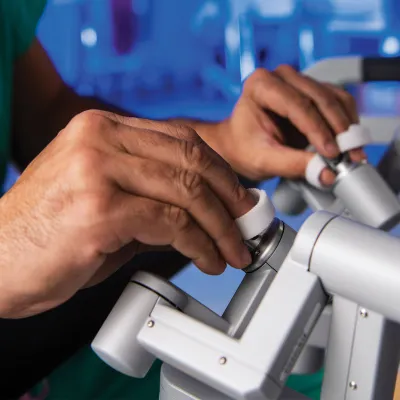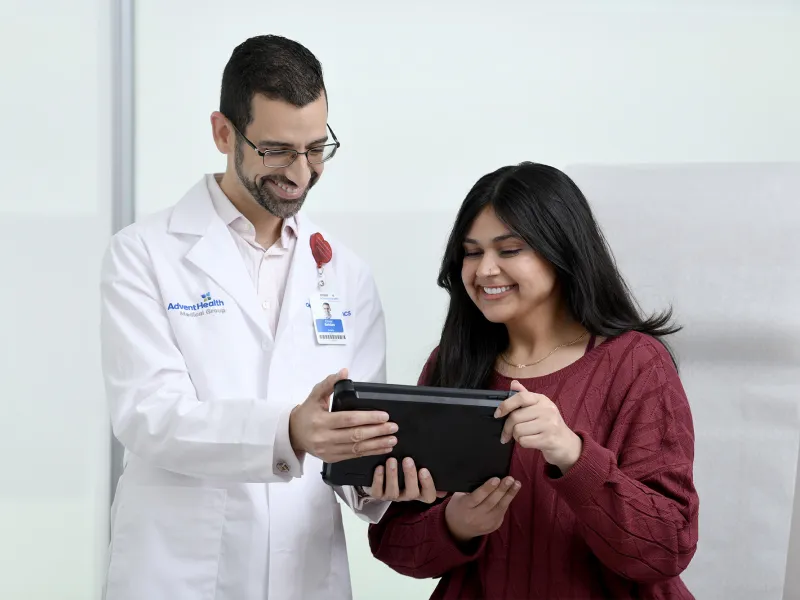
AdventHealth's Colorectal Surgeons Offer Advanced Treatment for Conditions of the Anus and Rectum
The anus is the last inch-and-a-half of the digestive tract, the point at which stool exits the body. Occasionally health conditions arise with the anus, and the rectum—which connects the colon to the anus and stores stool—may or may not be involved. The first signs of an anorectal condition are often rectal bleeding and anal pain or itching. Some anorectal conditions can also lead to bowel leakage.
Common Anorectal Disorders
The most common anorectal disorder is hemorrhoids, which occur when veins in the rectum and anal canal become enlarged and inflamed. Hemorrhoids are often caused as a result of constipation, bearing down during childbirth or simply by aging. They are most often associated with pain and bleeding. Most hemorrhoids improve on their own or with medical treatment such as topical creams.
Advanced Hemorrhoid Treatments
Sometimes hemorrhoids are severe enough to warrant their removal. This can often be done with a minimally invasive outpatient procedure such as banding, coagulation therapy or injection therapy. In more advanced cases, hemorrhoids may require surgical removal (hemorrhoidectomy) or a procedure called Transanal Hemorrhoidal Dearterialization. The colon and rectal surgeons at AdventHealth Digestive Health Institute are experienced in evaluating hemorrhoids and work with patients to determine which treatment option is right for each individual.
An anal fissure is a small tear in the anal lining that often leads to bleeding, pain and/or itching. Anal fissures can be caused by hard bowel movements, childbirth, diarrhea or anal inflammation. Some people with Crohn’s disease are prone to developing anal fissures.
Although they can be painful, most anal fissures are not serious and can be treated at home with over-the-counter creams. However, fissures that have not healed after eight or more weeks require medical attention. Nonsurgical options, including dietary changes, nitroglycerine cream and prescription medicines, can often heal a fissure. If those options still do not work, then surgery may be needed.
Surgery to Treat a Chronic Anal Fissure
Lateral internal sphincterotomy is the standard surgery to treat an anal fissure that will not go away after other treatments. The procedure involves cutting or stretching the internal sphincter muscle that surrounds the anal canal. This relieves the tension this muscle is usually under. With this tension gone, sphincter muscle spasms are prevented, allowing healing to occur.
However, because sphincterotomy puts some patients at high risk for fecal incontinence, the colorectal surgeons at AdventHealth Digestive Health Institute may decide that an anal advancement flap procedure is a better surgical option in some cases. This approach is a sphincter-preserving surgery. Instead of the sphincter being cut, the surgery involves transferring nearby skin to the anus. Because this healthy skin already has a good blood supply, it helps the anal fissure heal as normal tissue would.
When the glands around the anus get clogged and infected with bacteria, an anorectal abscess, or pus-filled sac, can form. The abscess can cause pain, bleeding, and fever. Antibiotics alone cannot usually be used for treatment, and surgery to drain the abscess is often needed.
However, in about 50 percent of anal abscesses, a tunnel is formed from the gland to the outside of the skin. This tunnel is called an anal fistula. It can be a very painful condition, and sometimes stool can leak through the fistula.
Surgery to Treat Anal Fistula
If the anal fistula does not involve too much of the sphincter, a procedure called a fistulotomy is used to fix the condition. This procedure is complex and requires a trained colorectal surgeon. The muscle and skin on top of the infected area are cut open. Sometimes this requires a small part of the anal sphincter to be cut. The result is an open channel that heals from the inside out. A seton drain made of a thin piece of rubber is often used to reduce inflammation so the fistula can heal. Depending on the size and depth of the fistula, a fistulotomy can be performed in the surgeon’s office under local anesthesia or at the hospital with general anesthesia.
Pilonidal disease is a recurring skin infection that results in an abscess at the top of the buttocks right above the tailbone. It is almost always caused by an infected hair follicle in this area. A pilonidal abscess may range from a small mass to one that is large, painful and oozing pus. Sometimes these abscesses go away on their own, but others require treatment. If the infection becomes severe, a patient may experience fever and nausea.
After a pilonidal abscess is drained, either on its own or through treatment, it is common for a pilonidal sinus to develop. This sinus is a cavity under the skin with one or more tunnels that lead back out through the skin. While these pilonidal sinuses can resolve on their own, some require surgery. This is especially the case for patients with a history of pilonidal abscesses that recur. Our colorectal surgeons have been trained to perform the procedures that resolve pilonidal abscesses and sinuses. AdventHealth Digestive Health Institute also helps patients prevent pilonidal abscesses from coming back.
Colon, Rectal and Anal Disorders
-
Anal Cancer
Our colon and rectal surgeons can help diagnose and treat anal cancer. We offer anal cancer surgery when necessary.
-
Anorectal Disorders
Surgeons at AdventHealth Digestive Health Institute offer advanced treatments for hemorrhoids, anal fissures, anal abscesses, anal fistulas and pilonidal disease.
-
Colon and Rectal Cancer
Our experienced gastroenterologists can diagnose and treat colon and rectal cancer. Learn more about treatment and surgery options.
-
Colon and Rectal Polyps
Colorectal surgeons and gastroenterologists at AdventHealth Digestive Health Institute offer advanced treatments for colon polyps, including sessile polyp and adenomatous polyp.
-
Colonoscopy / Flexible Sigmoidoscopy
A colonoscopy or sigmoidoscopy is a way for doctors to see inside the colon and rectum to identify issues and perform biopsies.
-
Diverticular Disease
The advanced gastroenterologists and colorectal surgeons at AdventHealth Digestive Health Institute help patients find cures for fecal incontinence.
-
Fecal Incontinence
The advanced gastroenterologists and colorectal surgeons at AdventHealth Digestive Health Institute help patients find cures for fecal incontinence.
-
High Resolution Anoscopy (HRA)
Colorectal surgeons at AdventHealth Digestive Health Institute are HRA providers (High Resolution Anoscopy) for anal cancer screening.

Recover Faster With Minimally Invasive and Robotic Surgery
The expert surgeons at the AdventHealth Digestive Health Institute have a large depth of experience in offering minimally invasive surgery.

Meet Your Dedicated Experts
Our specialists are passionate about providing collaborative care that addresses your unique needs and goals while ensuring you feel informed and supported every step of the way. Learn more about our team and their areas of expertise.

Surgical Consultations For Digestive Cancer Without the Wait
Appointments Within Seven Days for Patients with Cancer
At AdventHealth Digestive Health Institute, we know that after being diagnosed with cancer, patients want and often need to begin treatment quickly. So we make it a priority to offer appointments for cancer surgery consultations within five business days, and often earlier.
Patients who are newly diagnosed with cancer, or have just found out they have cancer again, qualify for this priority access. Our surgeons will make themselves available to see you right away, even for a second opinion. We want to help you start your treatment as soon as possible.
Let Us Help You Feel Whole Again
Whether you’re experiencing new symptoms or want a second opinion on a diagnosis, our dedicated digestive health experts are here to help you find answers and a path forward. Request an appointment today to take charge of your health and get the personal support you need.
